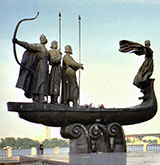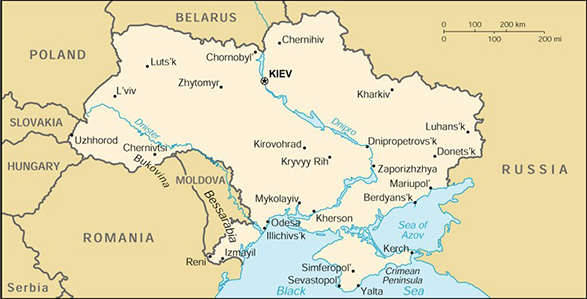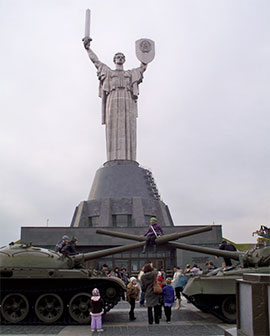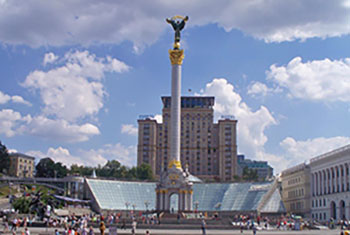The Ukrainian flag is a banner made of two equally dividing horizontal bars of blue and yellow. Because Ukraine has always been considered agricultural, many believe that the flag symbolizes the blue skies and the wheat fields.

Legend suggests that three brothers (Kyi, Shchek and Khoriv) and one sister (Lebid) founded the city of Kiev. The brothers built a boat and sailed the Dnieper River. Landing on the western bank, a new city was built and named after the eldest brother, who showed great leadership.

|



The territory of Ukraine is slightly smaller than Texas. It is located in Eastern Europe and is consider the second largest country in Europe. Ukraine was once known as the “bread basket of the Soviet Union.” Ukraine is comprised of 24 oblasts (regional provinces) and one autonomous republic: Crimea. (The territory of Crimea was annexed by the Russian Federation in March 2014. Ukraine considers the annexation to be a violation of international law and agreements by Russia.)
The territorial borders include Belarus to the north; the Black Sea and the Sea of Azov to the south; the Russian Federation to the east; Moldova and Romania to the southwest; and Hungary, Poland and Slovakia to the West. The population consists of approximately 44,600,000 people. The capital is Kiev with a population of 2,845,000.
Most of the topography of Ukraine consists mainly of steppes (plains and plateaus). The Carpathian Mountains are located in the west and the Crimean Mountains in the south. The major rivers are the Dnieper (Dnipro), Dniester, Southern Buh, Siverskiy Donets and the Danube. The Dnieper River is the third longest river in Europe. There are abundant reserves of iron and manganese ores, as well as bituminous and anthracite coals, in Ukraine. Traditionally, Ukraine is an agricultural country and is one of the world’s main centers of sugar production.
 According to the constitution, the official language of Ukraine is Ukrainian, but the vast majority of citizens are bilingual. Many people can speak in the Ukrainian language and the Russian language. In every day usage, the languages are both equally popular throughout Ukraine, although the proportion differs widely from region to region. Typically, the West predominantly speaks in Ukrainian, whereas the East speaks in Russian.
According to the constitution, the official language of Ukraine is Ukrainian, but the vast majority of citizens are bilingual. Many people can speak in the Ukrainian language and the Russian language. In every day usage, the languages are both equally popular throughout Ukraine, although the proportion differs widely from region to region. Typically, the West predominantly speaks in Ukrainian, whereas the East speaks in Russian.
The Ukrainian government consists of a presidential-parliamentary ruler. The parliament is called the Verhovna Rada (Supreme Council). Its deputies are elected for four-year terms. The principal government officials are the president, the prime minister, the foreign minister and the speaker of the parliament. The executive power belongs to the Cabinet of Ministers. The chief executive is the president who is elected for a five-year term.
In 988 AD, Valdimir the Great adopted Christianity (which evolved into Russian/Ukrainian Orthodoxy) as the major religion to unify the Kievan Rus. Religious persuasion consists of Ukrainian Orthodox (Kiev & Moscow Patriarchates) at 68%, Ukrainian Greek Catholic (Uniate or Byzantine) at 6%, Protestant at 3%, Ukrainian Autocephalous Orthodox at 1%, and Roman Catholic at 1%. Less than one percent comprise the Jewish and Islam faiths.
Slavic Missionary Service officially has been working in Ukraine since their independence, especially in the western region. When the tenets of the USSR dissipated, the need for Christian assistance arose. SMS began to work with the Christian leadership to establish new churches, colleges (seminaries) and Christian outreaches. The search for national workers (who would become SMS missionaries) was top priority. Also, funds were designated to the most strategic areas for the spread of the Gospel. SMS considers it a privilege to work and fellowship together with the believers in Ukraine.

Ukraine covers only one-time zone. The country is seven hours ahead of Eastern Standard Time in the United States.

The currency in Ukraine is the grivnia (hryvnia). Twenty-six grivnia equals one dollar.



